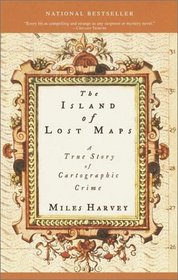The story moves forward - embellished often by interesting sidepaths. The author enjoys giving his opinion about all sorts of subjects.
"...In The Island of Lost Maps, a wonderfully rich excursion into ...what might be called cartographomania, Harvey follows Bland's tracks from library to library, reconstructing the crimes of the man he deems the Al Capone of map theft...
Along the way, Harvey examines the history of cartography generally, and the ravenous market for old maps-once the quiet province of a few knowing collectors, now invaded by speculators. These maps are just another corner of the overpriced status-symbol commodity market--and one that richly rewarded Bland's nefarious work.
Harvey's winding narrative, full of learned detours, adds up to a superbly rendered tale of true crime...one that will appeal to book lovers and mystery buffs in equal measure.
Gregory McNamee amazon
Interesting read--lots of info on maps, on research, and on human nature. A journey into the actions, though not the mind, of a thief. There's no great resolution to this book, but you will come away with a better appreciation for maps and why they exist.
A literary book, the story is told in a leisurely manner, the protagonist being a map thief.
A few photos and the author shares a great deal about maps, libraries, and commodities traded from distant places.
In Chapter Six, the Grand Stack Room of the Peabody Library is described. Lloyd A. Brown, the librarian from 1942-1956 is lauded for his excellent 1949 'The Story of Maps.' "Brown had not been an obvious candidate to write such a volume, but he'd had a couple of advantages going for him. The first was an obsession with old map. 'If you get bitten by a flea, I guess you have to live with it,' he once joked. The second was his own library's extraordinary collection. In researching The Story of Maps, Brown had needed to consult more than five hundred books. He delighted in recounting that all but ten of them were found on the shelves of the Peabody." Mr. Brown died in 1966 but here the author portrays him as an angry ghost watching Gilbert Bland cutting maps out of the books.
However, this is much more than a true crime story. The author ruminates on the nature of librarians, details the printing of pages with copper plates, shares with readers his visit with a restoration expert, and traces the great growth in the prices brought by old maps.
Sadly, those who bought the stolen maps (dealers) were not brought to justice.
Endnotes, index.




